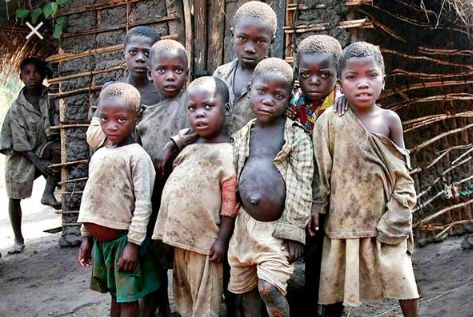According to estimates from the Poverty Clock at the World Data Lab, about 90 million people, or roughly half of Nigeria’s population, live in extreme poverty, Entrepreneur report.
Around June 2018, Nigeria surpassed India, a nation with seven times its population, to occupy the bottom position. To put it another way, if impoverished Nigerians were a nation, they would have a larger population than Germany.
In Nigeria, almost six people fall prey to this trap every single second.
Statistics on extreme poverty have long been divisive. The World Bank’s $1.90 earnings-per-day benchmark is the unit of measurement that a lot of nations and experts disagree with.
Whatever the justifications, denying people access to needs like food, healthcare, sanitation, education, and assets is the main cause of poverty.
And data, notably from India, demonstrates that resolving these problems typically helps populations escape the depths of extreme poverty.
Read Also: Cashless Transactions in Nigeria Surge 45.41% to N39.58trn
Here are three ways concerned stakeholders and policymakers may help with the efforts to fulfill the first of the Sustainable Development Goals (SDGs), which is to end poverty, as the world’s attention turns to my nation, Nigeria.
1. Investment in the education of girls
Over 10 million out-of-school children, roughly half of whom are girls, reside in Nigeria. It is hardly a coincidence that the nation with the highest percentage of people living in extreme poverty also has the highest percentage of out-of-school children. A 2.8 million child educational emergency has resulted from the concentration of two-thirds of this population in Nigeria’s densely populated northwest and north-eastern regions, both of which have been devastated by the terrorist group Boko Haram.
This image is best shown by the Oxford Poverty and Human Development Initiative’s 2018 Global Multidimensional Poverty Index (MPI). The poorest regions of Nigeria had the worst education outcomes (school attendance and years of schooling), which account for the largest percentage share of the MPI, followed by child mortality and nutrition all of which had the greatest impact on women.
It has been demonstrated that educating girls has benefits for the economy and future generations. Nigeria must expand its investment in education if it is to make progress on this front.
Read Also: Why Is Nigeria’s Inflation So High in 2023?
Over the past ten years, the education budget in my state of Kaduna where I am in charge of the institution charged with planning and allocating financial resources has steadily climbed.
The number of pupils enrolled in school has increased by a factor of two, from 1.1 million in 2015 to 2.1 million now.
With the greatest score in the senior school certificate exams, the state currently holds the top spot in the northern area.
2. Make health and well-being investments
Increased healthcare spending is associated with economic expansion and, consequently, with a decline in poverty. Malaria, tuberculosis, newborn and maternal mortality, and other crippling health indicators plague Nigeria, all of which have a significant influence on productivity.
To alleviate poverty, we must take advantage of demographic dividends by investing in people’s health, education, and livelihoods, particularly our children.
The late Professor Babatunde Osotimehin, former executive secretary of the United Nations Population Fund, stated in remarks on October 17, 2017, International Day for the Eradication of Poverty that “countries can see a boost to development, known as a demographic dividend, when their age structures change favorably, meaning that they have more people of working age than dependents.” This is provided that they empower, educate, and employ their young people.
On October 17, 2017, the International Day for the Eradication of Poverty, the late Professor Babatunde Osotimehin, a former executive secretary of the United Nations Population Fund, said in remarks that “countries can see a boost to development, known as a demographic dividend, when their age structures change favorably, meaning that they have more people of working age than dependents.
” They must empower, educate, and employ their young people for this to happen.
Reduced population growth is not a guarantee that poverty will disappear. The ideal engine for growth is a young population that is educated, strong, and resilient, as it has been in China. However, failure to plan or an inadequate resource allocation for utilizing this burgeoning population could be fatal.
3. Improve economic prospects and use technology
Nigeria’s economic output and citizen chances must be increased if poverty is to be eradicated. This will entail fostering the potential of human capital, generating employment possibilities for women and young people in rural areas, and boosting technical innovation.
According to the Human Capital Index of the World Bank, Nigeria is ranked 152 out of 157 nations. Adopting educational reforms that emphasize the development of new skills through effective and well-funded technical and vocational education and training programs for the millions of Nigerians who do not attend formal schools or who only have a primary education would be one of the low-hanging fruits.
As has been demonstrated in other nations, the government may significantly contribute to growth by encouraging private-sector collaborations through incentives and social impact bonds, as well as by fostering entrepreneurial ecosystems (with a major emphasis on apprenticeships).
Conclusion
Despite its drawbacks, access to microfinance has been shown to lower poverty globally. While there are legitimate justifications for providing grants and other social security benefits to those who are poor, it is crucial to incorporate them into the financial system so that governments can better organize and integrate services for the most vulnerable members of society.











